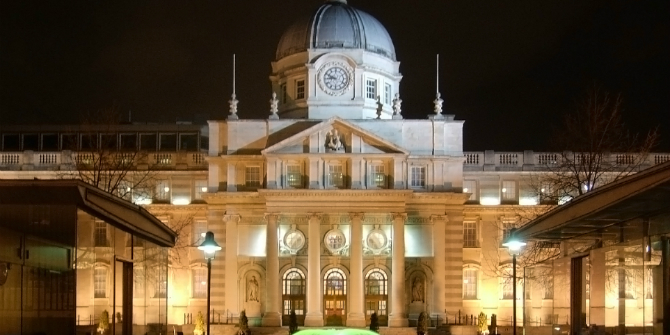 What is the Irish government’s Brexit wish-list? The suggestion that Irish unity, as opposed to safeguarding political and economic stability, is the foremost concern of the Irish government is to misunderstand and misrepresent the motivations of this key Brexit stakeholder, writes Mary C. Murphy (University College Cork).
What is the Irish government’s Brexit wish-list? The suggestion that Irish unity, as opposed to safeguarding political and economic stability, is the foremost concern of the Irish government is to misunderstand and misrepresent the motivations of this key Brexit stakeholder, writes Mary C. Murphy (University College Cork).
Following the UK vote in favour of Leave, the Irish government moved swiftly to identify its priorities for the Brexit negotiation period. These included: minimising the impact on trade and the Irish economy; protecting the Northern Ireland peace process; maintaining the Common Travel Area; and influencing the future of the European Union.
In mitigating the risks to the peace process, the Irish government has been explicit in its desire to avoid a hard border on the island of Ireland, to protect the Belfast/Good Friday Agreement, and to support continued north-south cooperation. Simultaneously, the Irish government wishes to maintain close trade between the UK and EU/Ireland and to minimise the regulatory burden for goods transiting the UK.
To achieve these twin objectives – no hard border on the island of Ireland and no barriers to trade between the UK and Ireland – Taoiseach Leo Varadkar favours the UK staying in the customs union and single market. However, in the absence of such a prospect, the Irish government supports the inclusion of the backstop in the Withdrawal Agreement. It is envisaged as an insurance policy in the absence of alternative solutions.
In welcoming the draft Withdrawal Agreement, the Taoiseach stated: ‘The text makes clear that this backstop would apply “unless and until” a better solution is agreed. I firmly hope that we can achieve that better solution, and will be working strenuously to that end’. The Irish government’s support for the backstop is a pragmatic rather than a political position – a means to maintain existing practices and conditions on the island of Ireland as set out by the Belfast/Good Friday Agreement if other options do not materialise.
For Northern Ireland unionists however, it is not the Irish government’s stated position which is problematic, rather it is more often than not, the manner in which that position is framed. When Foreign Minister Simon Coveney talks about achieving a united Ireland ‘in my political lifetime’, this is met with alarm by a unionist community which has long felt vulnerable and besieged. Unionists were similarly dismayed when Taoiseach Leo Varadkar promised nationalists in Northern Ireland that ‘You will never again be left behind by an Irish government’. The unionist response to these pronouncements is to question the motivations of the Irish government, and to perceive a link between the aspiration for Irish unity and the Irish government’s policy on Brexit. In reality however, there is little evidence to suggest that the Irish government is angling to achieve Irish unity via Brexit.
There are no policy documents, no public consultations, no Dáil debates, no civil society movements and no media sources actively agitating for a united Ireland. Notably, there is also a reluctance among Irish political parties to enter a coalition government (or a confidence and supply arrangement) with Sinn Féin, the party most wedded to future Irish unity.
 Image by Joopercoopers, CC BY-SA 3.0.
Image by Joopercoopers, CC BY-SA 3.0.
The priority issue for the Irish government is navigating Brexit in a manner which protects Irish economic interests, the peace process and the Belfast/Good Friday Agreement. There is unwavering commitment to the terms and spirit of the Agreement which includes provision for Irish unity by consent only. There is little appetite among the main Irish political parties for a discussion of Irish unity at this time, and perhaps more significantly, in the longer-term, there is no inevitability about the outcome of any such referendum in the Republic of Ireland. A recent RTÉ/BBC poll demonstrated that although 62 per cent of Northern Ireland voters perceive that Brexit increases the likelihood of a united Ireland, just 35 per cent of Irish voters feel likewise.
Moreover, unionists should not be fatalistic in their assessment. Talk of Irish unity, or even the holding of a border poll, does not presuppose the achievement of Irish unification. In fact, a border poll may conceivably copper-fasten Northern Ireland’s constitutional status when the many political, economic, social and cultural dimensions of a new Ireland are examined in depth. The assumption of majority support for Irish unity – among voters North and South – is by no means a given, particularly when it is being elicited in a political vacuum where discussion of detail and logistics is completely absent.
Let’s be clear, all Irish governments have aspired to Irish unity. However, for the current Irish government, achieving the least disruptive Brexit is its highest priority. Other debates, unexpected crises and new priorities will no doubt materialise in the longer-term, but for now stability and the status quo take precedence, and talk of Irish unity simply does not conform to that agenda.
This post represents the views of the author and not those of the Brexit blog, nor the LSE.
Dr Mary C. Murphy is a Lecturer at the Department of Government & Politics, University College Cork.







The U.K. parliament are wanting something in legally enforceable text.
I know that there is something that is being overlooked.
Let’s be honest here, this is about trust.
The EU does not trust the U.K. and the UK does not trust the EU. ( in itself a good reason to part)
It depends upon which country the agreement is registered. I suspect it will be registered within Europe.
That is important.
Uberrima fides
Untmost good faith.
In U.K. Law there is no obligation to act in good faith.
I know that as a fact, from bitter experience in a business challenge.
In Europe ( and therefore the ECJ ) there is a legal obligation to act in good faith.
There is your complete solution to the legal enforceability of the backstop to be temporary, given the assurances.
Fact!
There seems to be an almost universal belief that the Irish government’s actions have been motivated by a defence of the peace process. Nothing could be further from the truth. One of Varadkar’s first actions on taking office was to instruct the Irish customs service to stop cooperation on future border arrangements. An open border with a UK outside the EU requires cooperation with shared data on cross border shipments, exactly what happens now with alcohol import/export across the border due to differing duty levels. When cooperation stopped the only ‘open border’ solution left was continued SM/CU membership placing the border and peace process at the centre of the Brexit negotiations and so putting it at risk in the process. Varadkar covered this misdeed by constantly feeding the Irish press stories about how the UK advocated a hard border despite knowing the UK position was always to continue the CTA with no hard border. He even condemned the UK for the ‘Smart Border 2.0’ proposal (the one where individuals would have to pre register online for border transits) despite knowing it was in fact an EU proposal that the UK had nothing to do with. Varadkar then gave the whole NI border issue to the EU as a negotiating tool, refusing to even send an Irish representative to the withdrawal agreement negotiations despite repeated requests to do so by the UK government.
There has been much dishonesty by many politicians in the UK throughout the Brexit process but to find it about the NI border you need to cross the Irish sea.
The danger now is that at some future point a pro brexit government comes to power in the UK. Such a government may well decide to move to new rules and not feel constrained to assist the EU in policing its NI border. The result would be an Irish government under severe pressure to implement a border itself as EU rules require. A UK public that had previously put its own democracy on the table to keep the border open is likely to feel very differently when it learns it was the Irish government that prevented a technical solution.
The dissolution of the Union, not the European Union, the Act of Union, and the return of full national self determination to the peoples of England, Wales, Scotland and Ireland is the only long term solution. the English have wanted out of the EU for a long time, and on their terms, but Irish baggage and Scots voters have kept them and continue to keep them in. The Irish and Scots want to stay in, but the English are dragging them out against their will. It is clear that the “union” is a union in name only. The various peoples of the United Kingdom have very different visions for their futures and they should be allowed to follow them.
A good plan, but how to proceed against the wishes of the parties in question? For a start, the Union is more than just a Union. Is Matthew T Regan from the RoI, perchance? The Scots had a change to vote in an Indyref and voted to stay. I have no interest in the matter, but thought it an excellent idea for the Scots to try independence. The Welsh are unlikely to be interested in independence. Hmmm, would they try to remain solvent by legalising and growing dope, I wonder. Become the Thailand of Western Europe, perhaps-Sex sells.
No, that is not going to fly. The wee krankie is going for another Indyref, but NI wants to remain. I have suggested way back that a united Ireland would be a neat solution, but what can be done to make it even half-palatable to the ah, royalists in NI? There are always conundrums to be struggled with. Politics will allow the solution to surface in it’s own good time, for a time. Ideally, the RoI should join the Union, but they are still happily sucking the EU nipple while making hay as a tax haven for transnationals. Ah well, time will tell.
The Dis-United Kingdom, with its English Establishment, class-based, power/wealth at its core, this is the real problem. The English instinct is to colonise, not cooperate. The English Establishment feels that Europe is beneath them, a place to exploit – but from a distance, lest England become infected with the European diseases of equality and democracy, both of which are on display in England but only as tailor’s dummies in a shop window.
Partnership is out of the question, for that requires equals. The English don’t do ‘equality’, only superiority. All of this is muted and unspoken, but it underpins and dictates the so-called ‘British position’.
Westminster’s attitude to the other countries of the British Isles is just the same. But as more and more of the Establishment’s true colours is revealed, so more and more people are turning against it in disgust and anger.
Such is the game in progress under the title ‘Brexit’.